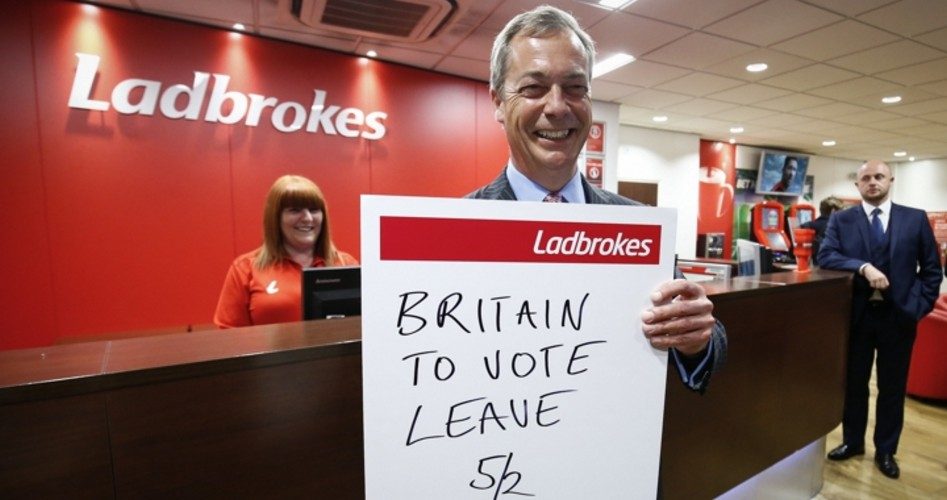
Increasingly, British voters are dismissing the dire warnings of “Project Fear” — the non-stop propaganda campaign of Prime Minister David Cameron, EU and IMF officials, President Obama, the major media, etc. — and the pro-Brexit side has now taken the lead.
Two opinion surveys conducted by British polling firm ICM Unlimited show support for Brexit (Britain exiting the European Union) has surged dramatically, going from as much as 13 points behind a week ago, according to some polls, to now leading by four points. The new ICM polls, one conducted by phone and the other online, were commissioned by the U.K.’s Guardian, a pro-EU, left-wing newspaper, and were released May 31, a little more than three weeks before the June 23 referendum that will decide whether Britain leaves or remains in the EU. The two ICM polls show the “Leave” side has now garnered 52-percent support, with the “Remains” now only holding 48 percent, a flip that is being called “a huge seachange.”
The Express newspaper quoted ICM’s director Martin Boon as saying, “Our poll rather unhinges a few accepted orthodoxies. It is only one poll, but in a rather unexpected reverse of polling assumptions so far, both our phone poll and our online poll are consistent on both vote intentions and on the EU referendum.” The turnaround in polling results, the Express reported, “could be due to last Thursday’s announcement net migration to the UK had risen to 333,000 in 2015 — the second-highest figure on record.”
The immigration/migration issue is certain to play a major roll in the final outcome of the Brexit vote, even though Prime Minister David Cameron says it will be decided on economic issues. However, on that point too, Cameron and the “Remain” forces appear to be losing as well, with a new poll by Ipsos-MORI showing most Brits are ignoring the predictions of financial doom the pro-EU forces are claiming the U.K. would face with a vote to leave.
“Two-thirds of Britons believe that they would not be worse off in the event of a Brexit vote, in a blow to the assembled forces of ‘Project Fear,’” the Telegraph’s economic correspondent Peter Spence reported on May 31, regarding the Ipsos poll. ”The findings came despite warnings issued by the Treasury, the Bank of England, the International Monetary Fund, and the OECD, all of which have cautioned on the economic repercussions of a Brexit vote to some degree, and suggest that most voters have been left unconvinced,” Spence noted.
The Telegraph article reported further on the Ipsos poll:
Some 58 percent of the public believe that their living standards would stay the same in the five years after a UK withdrawal from the EU, according to an Ipsos Mori survey of more than 4,000 Britons. A further 11 percent expect that their financial wellbeing would actually improve if voters decided to leave the political bloc behind on June 23.
The polling company’s analysis also revealed that concerns about the economy were most likely to affect the decisions of swing voters, for whom the financial consequences of a Brexit vote are felt more keenly than questions over British sovereignty or the migration debate.
The turnabout is remarkable, particularly considering the relentless hammering by politicians, bankers, establishment economists, and media commentators on the alleged economic calamity that would befall Britain should it vote to exit the EU. It may be an indication that despite the heavy anti-Brexit bias in the major media and the extensive (and expensive) “Remain” propaganda campaign by the British government and EU institutions, the pro-Brexit campaign’s strong economic arguments are winning out. As we reported earlier, televised debates featuring pro-Brexit spokesmen Nigel Farage (shown), Daniel Hannan, Kate Hoey, Lord Lawson, Ian Duncan Smith, Gisela Stuart, and others have repeatedly boosted the “Leave” side. (See debate videos here.) They have persuasively argued the British economy would fare much better with independently-negotiated trade deals, rather than being bound to the stagnating EU economy and its strangling regulations, taxes, and controls.
Widespread viewing of the powerful new documentary exposé “Brexit: The Movie,” has also, undoubtedly, contributed to the tilt toward the exit camp.
Angela Merkel, EU Politicians in Panic Mode
German Chancellor Angela Merkel publicly waded into the Brexit brawl on June 1, warning Britons that they would not likely get a good trade deal as non-members of the EU. This was a replay of President Obama’s anti-Brexit remarks while in England last April. Joining Merkel in the Brexit bashing are Dutch Prime Minister Mark Rutte, who has warned of EU retaliation if Britain votes to leave, and Spanish Prime Minister Mariano Rajoy, who has warned that Brits may lose their ability to work and live in Spain if Brexit passes.
Former London Mayor Boris Johnson, a Brexit supporter, said the “Project Fear” doom mongers had “hit the panic button” and called in Merkel in a desperate attempt to stop the groundswell of support for Brexit. But, as with the Obama intervention, Merkel’s meddling is likely to backfire.
Kate Hoey, a pro-Brexit member of parliament for the Labour Party, said Merkel would be “well advised to stay out of what is a very, very important vote for British democracy.”
“It is in Germany’s interests for the UK to stay in,” Hoey said. “That doesn’t mean that it is in the UK’s interests.”
“I really don’t think that Angela Merkel telling the British people how they should vote in a democratic referendum in three weeks time will affect anyone’s vote,” she said. “We can do extremely well outside the European Union — we don’t need to be in the single market, other countries trade with the European Union and are not in the single market. We are the fifth largest economy, we can look outwards.”
Merkel is already facing widespread hostility in Germany and throughout the EU (as well as within her own party) for the calamitous refugee/migration disaster she has helped engineer. She may have her own “Gerexit” referendum to deal with in the near future, with large percentages of Germans now joining other EU nationalities in demanding their own in/out referendums.
An Ipsos-MORI poll released on May 9 revealed that almost half of Europeans, 45 percent, want to hold Brexit-style votes. The Ipsos poll surveyed 6,000 Europeans from Belgium, France, Germany, Hungary, Italy, Poland, Spain, and Sweden on their feelings about the current state of the EU. One-third of European voters would vote to leave the EU if their country held a referendum today, the poll shows. “The Italians in particular hope to have their own opportunity to go to the polls on their EU membership — which lends a sense that even if the [Brexit] vote does stick with the status quo in June, it will not be the end of the EU’s woes,” Bobby Duffy, managing director of Ipsos-MORI told the Financial Times.
Photo of U.K. Independence Party (UKIP) leader Nigel Farage: AP Images
Related articles:
U.K. “Brexit” vote and “Project Fear”
Pro-Brexit Movie Masterfully Exposes EU Horror Show
Will Obama’s Anti-Brexit Remarks in Britain Backfire?
From Brexit to Swexit: Will Sweden Follow If Britain Exits EU?
Obama-Merkel Push TTIP, as Support for Transatlantic Union Tanks
Brexit Panic: CFR, Media Step Up Campaign to Scare British Voters
WikiLeaks: IMF Plans New Economic Crisis Before Brexit Vote
UK’s Cameron, Osborne Urge G20 to Scare Brits to Vote Against EU Exit


